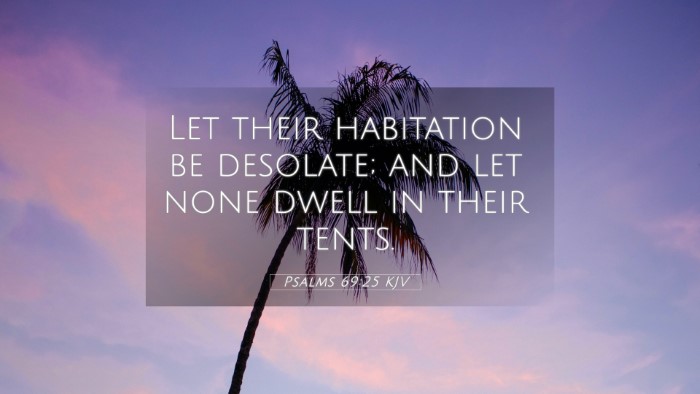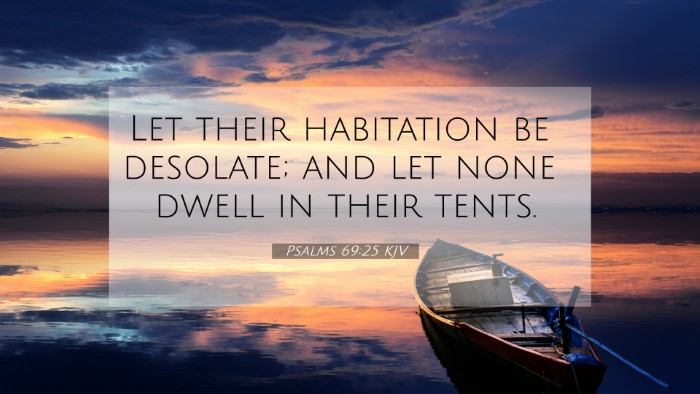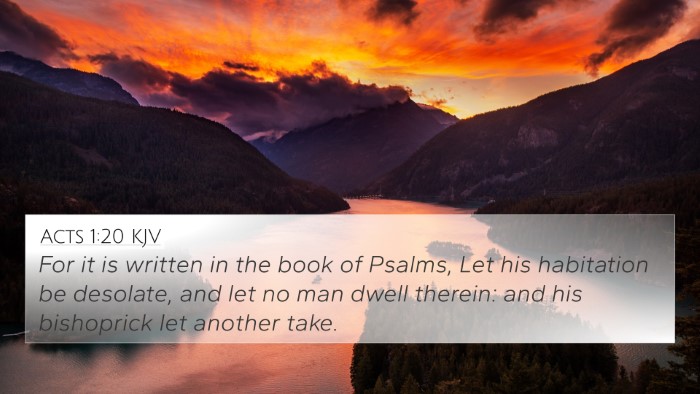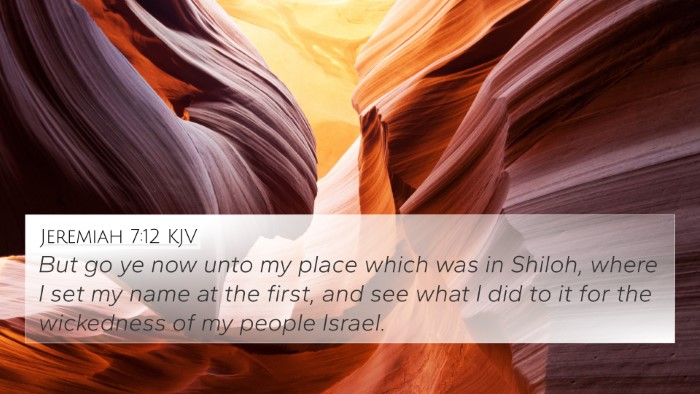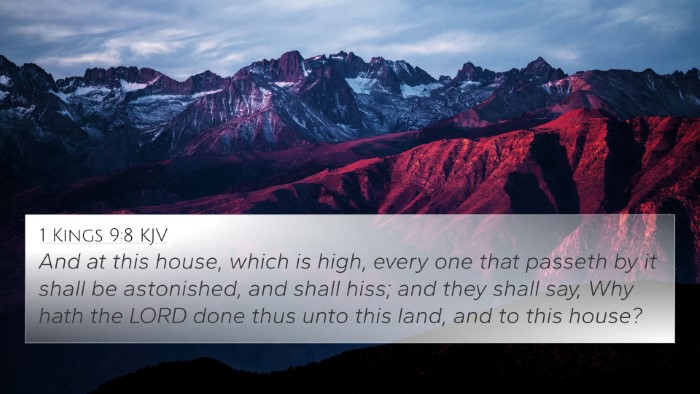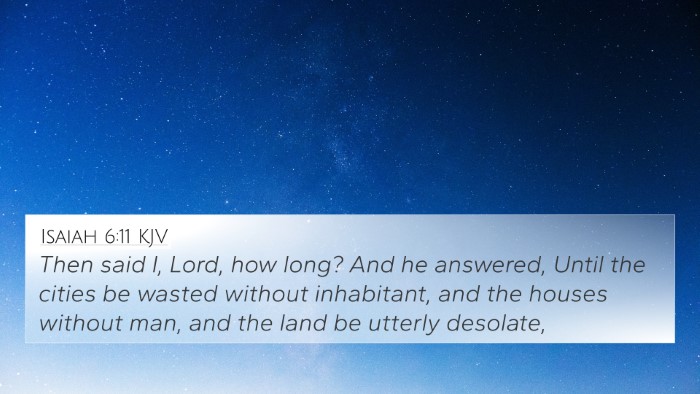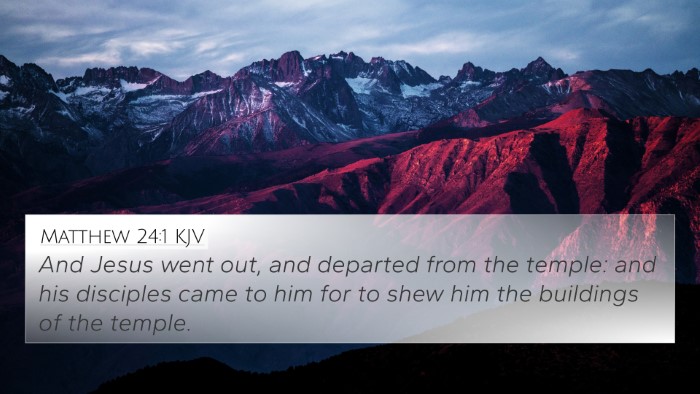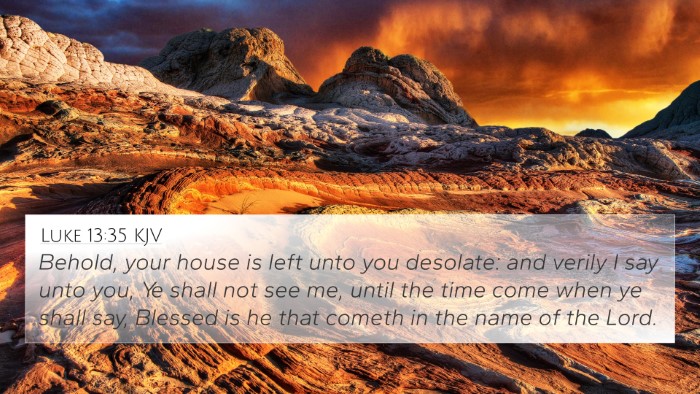Psalms 69:25 - Summary and Interpretation
Bible Verse: Psalms 69:25 (KJV) - "Let their habitation be desolate; and let none dwell in their tents."
Meaning and Summary
Psalms 69 is a poignant expression of distress and a cry for deliverance. In verse 25, the psalmist invokes a form of imprecation against his adversaries, asking for their habitation to be made desolate. This reflects a common theme found throughout the Psalms, where the psalmist confronts the apparent injustice and enmity faced from those who oppose God's people.
Insights from Commentaries
-
Matthew Henry:
Henry emphasizes the sadness and despair reflected in this psalm. He suggests that the desolation of the enemy's habitation reflects God's judgment. It serves as a solemn reminder that those who oppose God's righteous cause will ultimately face ruin, underscoring God's sovereignty over all nations and peoples.
-
Albert Barnes:
Barnes interprets this verse as a prophetic declaration that aims to highlight the fate awaiting those who instigate harm against God's anointed. He notes that the destruction of the enemies' dwellings symbolizes the spiritual desolation that arises from turning away from God, and it serves as a warning against opposition to divine will.
-
Adam Clarke:
Clarke reflects on the historical context of the psalm and notes that such curses reveal the deep anguish of the psalmist compounded by a sense of injustice. He alludes to the importance of understanding the heart of the psalmist's plea not merely as revenge, but rather as a desire for divine justice to be manifested among the nations.
Cross-References
This verse can be linked with several other scriptures that reflect the themes of desolation, judgment, and the hope for divine justice:
- Matthew 23:38: "Behold, your house is left unto you desolate."
- Luke 21:6: "These things which ye behold, the days will come, in the which there shall not be left one stone upon another, that shall not be thrown down."
- Jeremiah 9:11: "And I will make Jerusalem heaps, and a den of dragons; and I will make the cities of Judah desolate, without an inhabitant."
- Isaiah 6:11-12: "Then said I, Lord, how long? And he answered, Until the cities be wasted without inhabitant, and the houses without man, and the land be utterly desolate."
- Revelation 18:2: "And he cried mightily with a strong voice, saying, Babylon the great is fallen, is fallen, and has become the habitation of devils, and the hold of every foul spirit."
- Nahum 3:10: "Yet was she carried away, she went into captivity: her young children also were dashed in pieces at the top of every street."
- Psalm 37:10: "For yet a little while, and the wicked shall not be: yea, thou shalt diligently consider his place, and it shall not be."
Thematic Connections
The themes present in Psalms 69:25 exhibit significant connections throughout the scripture, often relating to divine judgment upon the enemies of God and the hope for restoration for His people.
-
Justice and Desolation:
The repeated motifs of desolation resonate through both the Old and New Testaments as seen in the verses cited above.
-
The Righteous Judgment of God:
The plea for desolation serves as a reminder of God’s ultimate judgment upon sin and rebellious nations, reflecting a broader theme throughout the Bible.
Understanding the Context
To fully grasp Psalms 69:25, a deeper understanding of its context within the entire Psalm is crucial. The psalmist is grappling with personal suffering, injustice, and a longing for vindication.
-
Historical Context:
Psalms 69 is attributed to David, reflecting his emotional turmoil during periods of immense suffering, possibly during his conflict with Saul or Absalom.
-
Liturgical Interpretation:
Throughout Jewish history, this Psalm has frequently been used in liturgical settings to express communal lamentation, invoking God’s mercy and justice.
Applications and Reflections
Readers are encouraged to reflect on the implications of this verse in their spiritual lives, recognizing the balance of seeking justice while trusting in God’s timing and providence.
-
Personal Reflection:
Consider how you respond to injustice and conflict in your own life. Are you seeking vindication or are you trusting in God's ultimate authority?
-
Community Engagement:
Engage in discussions about justice and mercy, considering how your faith informs your understanding of both concepts.
Conclusion
Psalms 69:25 invites readers into a complex interplay of justice, despair, and hope. Through cross-referencing this verse with biblical texts across both Testaments, we see a fuller picture of God's character and His dealings with humanity. This verse, while a plea for destruction against enemies, ultimately underscores the need for divine justice—something that echoes throughout the entirety of Scripture.

